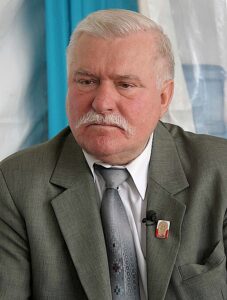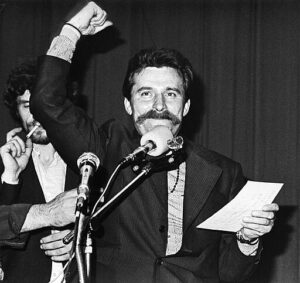
Former Solidarity union leader and former President of Poland Lech Walesa, 81, strives to be relevant in 2025. Walesa, or Wałęsa as it is spelled in Polish, issued a public statement in March condemning the treatment of Ukrainian president Volodymyr Zelenskyy by both President Trump and Vice President Vance during an extraordinary meeting at the White House on February 28. The letter was co-signed by 38 other former democracy activists who were imprisoned by Poland’s Moscow-backed communist regime before 1989. Later this year, he is embarking on his first-ever North American lecture tour on the themes of democracy and freedom.
So, who is Lech Walesa (Wałęsa)* and why is this letter so significant?
From union organizer to leader of the Solidarity movement in Poland

Anyone familiar with the fall of communism in Europe in the 1980s should recognize the name Lech Walesa. His accomplishments are many, even when summarized. Born in 1943, he began work as an electrician in the huge Lenin Shipyard in Gdańsk in 1967. There he witnessed food riots in 1970 in which police killed several demonstrators. In 1976, more unrest against the communist government arose, and he became a union activist. Later that year he was fired for his anti-government activities and was forced to take temporary jobs to support himself and his growing family.
In 1978, Pope John Paul II became the first Polish pope, and world attention began to turn towards Poland. When he visited Poland in June 1979, he held Masses and gave more than 35 appearances and talks in nine days. He spoke to millions about the history of Poland, human rights, democracy, and the right of Poles to freedom. With the implied support and attention from the leader of the Catholic church, union organizers found strength and renewed motivation. (More on St. John Paul II at this link.)
On August 14, 1980, during protests at the Lenin Shipyard caused by an increase in food prices, Walesa climbed over the shipyard fence and joined the workers inside, who elected him head of a strike committee to negotiate with management. Some ten million workers joined unions, which then coalesced into the Solidarity (Solidarność) movement. He was named leader and spokesman of the movement, and in October 1980, the government officially recognized Solidarity, the first and only independent trade union in the Eastern Bloc.
The 1980s: Worldwide attention, a Nobel Peace prize, an autobiography, and the fall of communism

The world media took notice as the fight for pro-democracy and anti-communism encompassed millions of people. Time magazine featured a cover article “Poland’s Angry Workers” on September 1, 1980. Time then featured Lech Walesa as the cover story on December 29, 1980, with the title “Shaking up Communism.” Newsweek featured Walesa as its cover story on December 8, 1980, with the title “Challenge to Moscow.”
The communist government went on the defensive. In January 1981 Pope John Paul II met with Walesa in the Vatican. As a key footnote, on May 13, 1981, an assassination attempt was made on Pope John Paul II. Though never proved, many historians consider this was a direct attempt by the Russian KGB to silence a powerful voice they could not arrest, imprison, or control. Poland imposed martial law in Poland on December 13, 1981, banned Solidarity, and arrested Lech Walesa and other leaders of the movement. But by now, the world was watching. Even Playboy magazine featured a story on Lech Walesa, “The Truth Behind the Drama in Poland,” in its February 1982 edition.

On October 5, 1983, Lech Wałęsa was awarded the Nobel Peace Prize for his non-violent struggle for free trade unions and human rights in Poland. The award encouraged the underground movement, but further threatened the Polish communist government, who condemned the award. Newsweek featured Walesa on its October 1983 cover. Though now free, he sent his wife to Oslo to accept the prize. He feared being exiled from Poland if he were to leave the country.
In January 1987, Walesa published his autobiography, A Way of Hope. The book is still available on many used book sites and is also available on the Internet Archive at this link.
Communism in Poland fell in the summer of 1989, with the first round of presidential elections held in June. Solidarity won by an overwhelming majority. In November 1989 Walesa received the (US) Presidential Medal of Freedom and became the first non-head-of-state to address a joint meeting of the United States Congress.
The 1990s: President of Poland and scandal
Lech Walesa served as president of Poland from 1990 to 1995. He narrowly lost his bid for re-election in November 1995. After his defeat, Walesa played a marginal role on the political scene. In 1996 he returned to work at the Gdansk shipyard in protest of a law that barred ex-presidents from collecting a pension. He remained at the shipyard for only one morning and within a month he was granted a pension. He ran again for president in 2000 and also lost.
Is it lies or conspiracy? It depends on who you talk to. As early as the 1970s, a few fellow Solidarity members accused Walesa of working with the communists. He adamantly denounced the allegations as a conspiracy and lies put forth by the communists. Another explanation given was he might have signed a few documents in the early 1970s just to satisfy them.
In 1991, Jarosław Kurski, a former spokesperson for Walesa, published a book, Wódz, (translated as “Leader” or “Chief”) in Poland accusing Walesa of cooperating with the Polish Secret Service. Though accusatory and still out there, the book never gained the traction and notoriety of Lech Walesa himself.

In 2000 he was cleared of all charges. Then in 2016, new documents surfaced that purportedly document that he served as a communist informant, code name “Bolek.” Poland’s Institute for National Remembrance released the documents, which Walesa again claimed were forgeries by his political enemies. Again in 2023, he faced the same charges. Still, he remains popular and recognized worldwide. The airport in Gdańsk was renamed the Gdańsk Lech Wałęsa Airport in 2004. In 2013, a biopic film by famed producer Andrzej Wajda came out entitled Walesa. Czlowiek z nadziei (Walesa: Man of Hope.)
Today: Advocate for democracy and defender of Ukraine
Like him or loathe him, there is no question that Lech Walesa has played a significant role in modern Polish history. His opinions still carry weight and respect.
Which brings me back to March 2025. History is complicated. Ukrainians during World War II were part of Russia and brutalized Poles and held executions. Yet, Poland and Ukraine share many historical similarities. I teach a class (among others) that compares Stalin’s invasion of Poland in 1939 to Putin’s invasion of Ukraine in 2022. Russia is the unprovoked aggressor and commits egregious crimes against civilians. In both cases, Russia attempts to destroy the country, and the culture, and reclaim the lands and people for “Mother Russia.” In both cases, Poland and Ukraine are outnumbered and need their allies to stand against Russia.
So when the President and Vice-President of the United States sand-bagged and blasted Ukrainian president Volodymyr Zelenskyy, a foreign head of state, on February 28, 2025 as “ungrateful,” I cringed in embarrassment and shock with many others around the world. Even worse, Ukraine was asked to accept Putin’s terms, the veritable equivalent of surrender. Unlike in Poland’s case, many allies rushed to stand with Ukraine. Lech Walesa posted a public statement of concern in support of Ukraine.
“Your Excellency, Mr. President, We watched the report of your conversation with the President of Ukraine, Volodymyr Zelensky, with fear and distaste. We find it insulting that you expect Ukraine to show respect and gratitude for the material assistance provided by the United States in its fight against Russia…” I wish I had room to reprint the entire text because it is excellent. It can be found online in many social media posts.
An evening with President Lech Walesa – North American tour
In an unprecedented move, President Lech Walesa will visit 28 cities in the US and Canada on a speaking tour from August to October. I already have two tickets to hear him when he comes to Phoenix on September 2. If you are there, be sure to say hi! For more information on his speaking tour and to buy tickets, go to historyexplorer.com.
*The correct spelling of his name is Lech Wałęsa, with the Polish letters, though internationally it is often written as Lech Walesa, without the Polish diacritics. The Western version is easier to pronounce and more recognizable to English speakers. Walesa himself is using the Western version in announcements for his North American tour. The two versions are often used interchangeably. When searching for information it’s best to try both spellings.
In friendship and gratitude,
Katrina


13 Comments. Leave new
Greetings to you Katrina, wonderful article about Lech Walesa. I have written a WWII screenplay inspired by a close elderly neighbor who was abducted from her village as a young teen by SS troopers and sent to work on a German farm as forced labor. The screenplay HEIMRICH FARM has won 27 trophies and awards at film festivals all over the world. I will soon be attending a speech by Mr Walesa and am hoping to be able to talk to him about this story and neglected part of Polish history. Would you happen to have a way of contacting him? It would be very much appreciated!
Thanks for your comments. Unfortunately, I don’t have any connection to Mr. Walesa so can’t help you there.
Very good article on the former President of Poland and his upcoming tour which I have a ticket to in October in NYC.
Thank you!
Thank you Katrina for that excellent essay. I have reserved a spot for the VIP Meet and Greet before his Minneapolis appearance in September. The ticket was very expensive for me on a fixed income, and I hope it won’t be a letdown. Can you tell me, of the biographies and autobiographies of Walensa, which would you recommend as the best? Also, I would like to get in touch with others who may be planning on attending his appearances. Do you have any suggestions for that?
Hi Don, I don’t have one particular book to recommend over another as I haven’t read them. I expect he will sell his own books at the event. I’m not familiar with Minneapolis, but I would reach out to the Polish community there to ask around. I located The Polish-American Cultural Institute of Minnesota, and I’m sure there may be others. Best wishes,
Will the tour be in
English, I would like to buy tickets for the night
in Philadelphia. He is the Polish Nelson Mandela.
Hi, I would refer you to the website. I attended his presentation in Phoenix. He speaks only in Polish, but has an excellent translator throughout the presentation.
Hi Katrina, thank you for bringing attention to former Polish President Lech Walesa. It’s amazing that, in his 80s and with his many health issues, he is doing this extensive speaking tour in the U.S. and Canada.
Sounds very interesting and would like to go when he is in NC
There is a mistake in the first paragraph. Mike Pence was definitely not at that meeting in the White House. It was JD Vance our present VP
Thanks for the catch.
What happened, no coverage, no splash? Why?
I’m not sure I can respond to your question. I only wrote about the tour but I am not affiliated with it in any way.